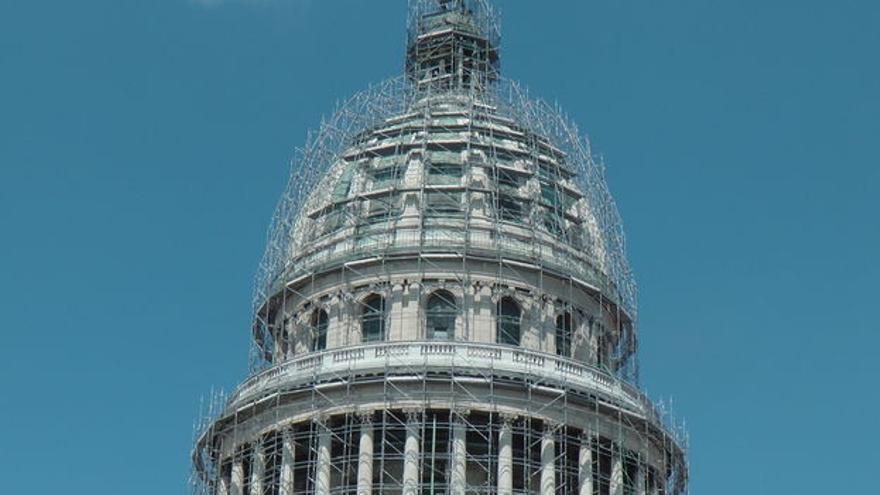
![]() 14ymedio, Havana, 18 August 2022 — Cuba Archive, an organization incorporated in Washington, D.C., started a petition on Thursday, Cuba libre: Compromiso de transición a la democracia [Free Cuba: Commitment to a democratic transition], on Change.org, and invites “all Cubans and Cuban organizations,” on the Island and abroad, to join a national “civic commitment” with a view toward a democratic transition.
14ymedio, Havana, 18 August 2022 — Cuba Archive, an organization incorporated in Washington, D.C., started a petition on Thursday, Cuba libre: Compromiso de transición a la democracia [Free Cuba: Commitment to a democratic transition], on Change.org, and invites “all Cubans and Cuban organizations,” on the Island and abroad, to join a national “civic commitment” with a view toward a democratic transition.
The petition, which already has more than 100 signatures, presents a “peaceful change toward an organized state under the principle of democracy”, which would propose a solution to the crisis which currently affects all levels of life in Cuba.
With four main targets, Cuba Archive’s petition proposes to residents of the Island a process of “resistance, civil disobedience and non-cooperation” with repressive state institutions, as well as a “national debate” characterized by a variety of opinions.
It also challenges the regime to “dismantle repressive organizations and to make a peaceful transition viable” and for public officials to preserve state archives, which will be indispensable for the Island’s democratic future. Lastly, it demands that the international community not “extend credit or material assistance” to the government, except for humanitarian assistance provided through independent organizations.
In addition, Cuba Archive calls on “Cubans of good faith,” including civic and religious leaders, public figures, intellectuals and artists.
According to the organization, Cubans should look to the Constitution of 1940 as a reference to restructure the Cuban legal sphere, so long as the articles considered “exclusionary or impractical for the times” are removed.
A set of 19 recommendations round out the petition. Together, these provide the backbone for a well-defined program for a democratic transition on the Island. The proposals include naming a provisional government “of limited duration,” the members of which will not be eligible to hold office during the first free elections.
Special powers will be conferred upon the provisional government to restore fundamental citizen rights, repair the administration of the country, and plan for general elections within 24 months. Furthermore, it will be responsible for drafting a new Constitution for the Republic.
Another one of the recommendations is the prohibition of the death penalty, violence and vandalism against public property and public goods.
With regard to the Communist Party, the petition does not specify if it will be outlawed or not, but clarifies that the abolition of its influence and control over the state is indispensable for the transition toward democracy. The political police and all repressive organizations, which take direction from it, will also be dissolved.
Cuba Archive proposes the dissolution of the current government apparatus, declaring its members unfit and replacing all government officials. However, until elections are held, it recommends provisionally maintaining the state’s administrative structure.
It emphasizes that members of the military and government employees who have not committed “crimes against humanity such as torture, murder, forced disappearance and prevarication” may form part of the new arrangement, so long as their innocence has been validated through judicial mechanisms.
The legalization of organizations and political parties prohibited by Castroism, as well as the release of prisoners of conscience will be indispensable measures for guaranteeing a democratic future on the Island; so too will the repeal of laws that go against human rights, especially the rights to “self-determination, conscience, expression, press, information, association, assembly, movement, organization, privacy and religion.”
With this goal, it aims to prioritize “the dismantling of state monopolies over the press, education and communications”. The organization also describes possible lines to follow for agricultural, economic and trade development.
In the international scope, one significant recommendation is to suspend the refuge which the current government provides to “foreigners with ties to terrorism, drug trafficking and other activities which run counter to the good of the nation.”
This measure is in line with new legislation on the extradition of American fugitives on the Island, introduced on August 3rd in the U.S. Congress by Senators Bob Menédez and Marco Rubio.
Cuba Archive, also known as the Free Society Project or Archivo Cuba in Spanish, describes itself as a non-profit organization founded in 2001 to promote human rights on the Island through research and information. Its advisory board includes Cuban intellectuals such as Pedro Corzo, Enrique Encinosa, José Conrado and Carlos Alberto Montaner.
Translated by: Silvia Suárez
____________
COLLABORATE WITH OUR WORK: The 14ymedio team is committed to practicing serious journalism that reflects Cuba’s reality in all its depth. Thank you for joining us on this long journey. We invite you to continue supporting us by becoming a member of 14ymedio now. Together we can continue transforming journalism in Cuba.
